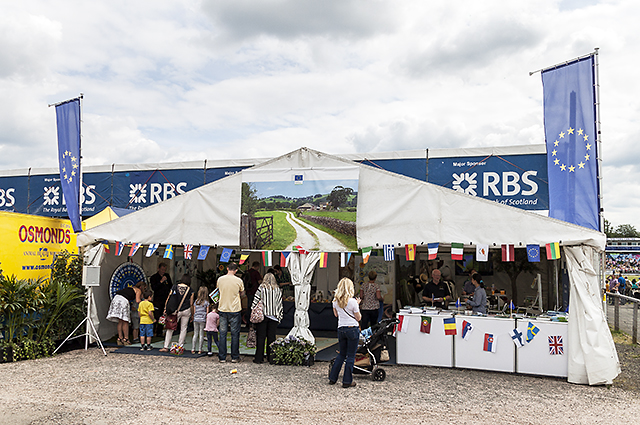 With the prospect of losing timely and tariff-free access to the single market – as well as migrant labour – farmers face even more uncertainty than most as a result of Brexit. Richard Byrne (Harper Adams University) explains the changes that Brexit is bringing.
With the prospect of losing timely and tariff-free access to the single market – as well as migrant labour – farmers face even more uncertainty than most as a result of Brexit. Richard Byrne (Harper Adams University) explains the changes that Brexit is bringing.
The last sheep sale before Christmas at Welshpool livestock market was seen by many as a good one. Trade was brisk and the prices were high. Buoyed by a falling pound, most sales were for the growing export market to Europe where the demand for lamb is high. The Christmas cheer, however, belied wider uncertainty in the agricultural industry.
Brexit brings many challenges for agriculture, and while some on social media have been delighted to see that those in the farming community – many of whom voted for Brexit – now express concern at the potential impacts of leaving the EU, the reality is that UK’s food system is in a state of flux.

The concern over Brexit’s impact varies with the agricultural sectors. Within the livestock sector, most focus is on the changes to the Basic Payment Scheme (BPS). The BPS is the largest part of the EU Common Agricultural Policy and is a form of income support which replaced the commodity based subsidy system . For many upland farmers this payment can make up to 50% of their farm income. As the UK transitions to a UK Agricultural Policy it is proposed that this payment is stopped and replaced by a system which pays farmers to produce environmental goods rather than food. For farmers with homogenous landscapes, there may be limited opportunity to access the upper tiers of payment, while the actual budget for these payments is likely to be much lower than current rates of BPS payment.
It is, however, the loss of timely and tariff-free access to the EU’s single market which may bring the biggest impact. The UK food production system has over the years become increasingly intertwined with EU processors and markets. UK food exports are worth around £5.2bn, with the EU the fastest-growing market. Products are either exported as a whole product or as ingredients, some of which returns to the UK as a completed processed item. Much of this processing is seasonal and just in time, with manufacturers timing arrivals at factories to minimise holding times and finely balancing production with market demands. Any interruption to this will have profound impacts on the desirability of UK produce, particularly when some 40% of Welsh lamb exports and 80% of dairy exports go to the EU.
The loss of the customs union may also have impacts on specific sectors. The organic sector has seen growth of more than 7% in the last few years, with the key EU markets being Germany, France and the Netherlands. The organic label is currently an EU-wide recognised standard across crops and livestock – which, without an agreement between the EU and the UK on recognition, is in doubt – leaving UK producers having to engage in costly re-certification, or being unable to export as organic standard.
The loss of the Customs Union and logistic disruption will also have a wider impact on the availability of animal medicines, crop protection products, machinery spares and fertilisers, all of which are largely sourced in the EU. In particular the UK horticulture sector (both vegetables and soft fruit) could suffer a double hit, with the additional challenges around accessing migrant labour. The full extent of the impact on the agricultural support supply chain is yet to be mapped.
While the loss of market access is an issue, the opening up of the UK market raises other concerns. It has been mooted that in the event of no deal, the UK would allow the free movement of EU products into the UK to maintain food supply. While this would benefit the consumer, UK agricultural producers would still face tariffs exporting to the EU. Of greatest concern is the proposed UK-USA Free Trade Agreement. Whilst the media headlines are dominated by stories of chlorinated chicken, the key issues for farmers are not only the scale of US farming which lowers cost, but also the different animal welfare and environmental standards as well as the use of growth promoters which also make US production a lot cheaper than the UK. While consumers often say they want high welfare and environmental standards, this frequently does not translate into what they choose to buy. The UK accepting such products, possibly tariff free, has been highlighted as a key threat by industry bodies.
So where does this uncertainty about agricultural policy, access to markets and opening the UK to lower regulatory standard products leave the agricultural industry? Some farmers will carry on, hoping something will happen to give them certainty or at least a degree of assurance. A few talk about the opportunities that Brexit offers, although in the farming press these voices are becoming somewhat subdued. Talk of a bonfire of regulations becomes less likely as potential trading partners seek assurances on standards and market access.
One sector which was initially thought to benefit most from Brexit were pig producers. The UK produces half of its requirement, and if tariffs were applied to EU imports of Dutch and Danish bacon, the cost-effective choice for consumers would be to turn to UK-produced pork. However, the downside would be EU tariffs – which could range between 10% and 80% depending on the product – and could be applied to the UK’s small but important pork exports (which are mainly fattier cuts), 70% of which go to the EU, principally Germany. For many producers the extra value gained even from these modest exports is important. If EU producers gained tariff-free access to the UK market, the consequences could be devastating.
Others sectors are reacting in a more pragmatic way. Already some soft fruit producers have reassessed their planting and production plans for 2019/20. While there has been much talk in the press about robotic strawberry picking machines, a cost-effective solution is some years away, meaning producers are looking to balance labour with production in a way they have not done before. Some have adopted more efficient ways of growing, such as raised beds which speed picking; others have moved to higher value crops or varieties for niche markets. A few producers have decided to sell up and relocate to the EU, and a few have decided to cease production totally and sell their land.
For many arable farmers, it is a time to evaluate and plan, which has led to a steadier response. As the UK is only a small grain exporter, most being used in domestic production, the impact on those producing milling wheat is considered to be less. However, the UK is a sizeable exporter of feed grains, especially to Ireland – a trade which could be quite severely affected, especially in a no deal Brexit. Since the referendum there has been reflected in a decline in farmland prices, although a slight increase occurred in the last quarter fuelled by investment purchasers, both linked to the uncertainly in the wider market. Many farmers are looking to maximise their returns further, with efficiency gains reflected in the machinery market (both new and secondhand) where the move is to bigger machines. Farmers are seeking to minimise expenditure and, aware of the impending decline of the BPS, place themselves in a better financial position before it ceases. Ironically for the UK farmer the devaluation of the pound has increased the BPS payment, as it’s calculated in euros, which may aid some in decreasing future liabilities.
Overall, the UK farming industry is carrying on, as it clearly has little choice. While farmers can improve efficiency, move to higher value niche markets and reduce debt they are ultimately at the mercy of the impending Brexit deal and will then be heavily influenced by the nature of the forthcoming UK agriculture bill. Ultimately though it will be, it is the nature of the UK’s trading relationships which will drive the shape of the industry. Full exposure to the big global exporters would undoubtedly mean a consolidation of UK farm holdings to drive efficiency – with impacts on the countryside and communities alike. In the short term, though, amid the uncertainty, farmers can do little more than to focus on the weather and the seasons which drive the agricultural cycle.
This post represents the views of the author and not those of the Brexit blog, nor the LSE.







What a depressing read. Do little more than focus on the weather and the seasons? Is farming in the UK that simple? UK farmers have had since 2013 to prepare for a change in the political weather and globalised farming. Is it possible that farming advisory services are geared to keep the small(ish) family farmers ignorant as much as possible? The DEFRA is not exactly favouring the family farmers, least of all the hill farmers. Likewise, the farmers are represented and advised by organisations who, in their dealings with big government, seem to favour big agri business. If I were a farmer in the UK I would take most political advice with a sack of salt, and weigh the options given me by the government, experts or otherwise, and non-practising commentators on their merits. The piece above is probably meant to give an indication of what farmers are facing, for the benefit of city folk. For the sake of self-sufficiency in food supply, one hopes that UK farmers are doing more than keeping an eye on the weather and the seasons.